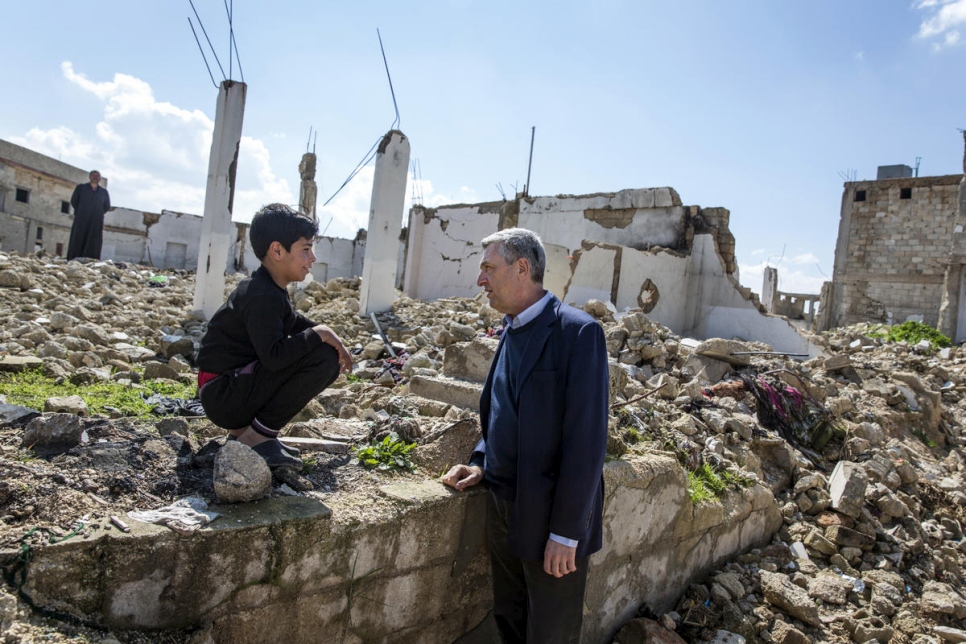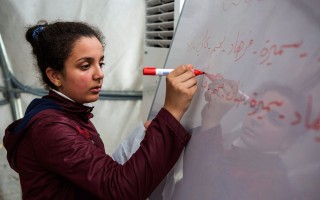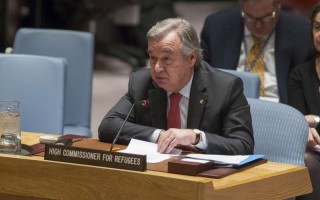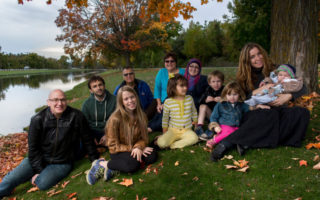
UN Refugee Chief Filippo Grandi visits the ruins of Souran and speaks with a young returnee, in Souran, Syria. © UNHCR/Andrew McConnell
On his fourth visit to Syria as High Commissioner for Refugees, Filippo Grandi assessed the massive humanitarian needs facing the population here. After eight years of war, he observed that the magnitude of the humanitarian problem is staggering, exacerbated by the millions of people uprooted from their homes.
The years of violence and destruction forced virtually every second Syrian to flee their homes – more than 5.6 million Syrians live as refugees across the region and millions more Syrians are internally displaced. Estimates are that over 1.4 million internally displaced people (IDPs) returned to their homes in Syria in 2018. Some Syrians are also slowly returning from neighbouring countries to areas where they feel safe.
Mr. Grandi reiterated UNHCR’s policy to help those displaced – in Syria and abroad. He also said that Syrians returning voluntarily home and settling back into their community need humanitarian support.
The High Commissioner met with returnees yesterday in the town of Souran, in Hama Governorate, where many internally displaced people and some refugees made the voluntary decision to return to their shattered homes. The returnees spoke to him about the challenges to resume life in their communities: damaged or destroyed buildings and infrastructure, lack of economic opportunities and inadequate services.
The High Commissioner also visited internally displaced families in Damascus living in harsh conditions in damaged and abandoned buildings. The homes they fled from were just several kilometers away, but they expressed reluctance to return citing worries about safety, even poorer infrastructure and the lack of means to repair the damage.
In his meetings with senior government officials, the High Commissioner emphasized that UNHCR’s access to people returning is critical in order to assess their needs and assist with their initial reintegration where support is needed. He noted that where we had this access, UNHCR with its UN and NGO partners was making efforts to rehabilitate homes, repair schools and reestablish health points and bakeries, as well as access to documentation. UNHCR’s work with returnees includes help to reclaim documents, responding to the needs of unaccompanied and separated children, as well as counselling and specific support to particularly vulnerable individuals.
The High Commissioner reiterated to the government the importance of continuing to also remove obstacles of legal and administrative nature.
Mr. Grandi also expressed his grave concern for the civilians trapped in ISIL-held areas in Northeast Syria and also about the conditions for the over 50,000 people who have sought shelter in the Al Hol Camp since December. He expressed concern for the desperate conditions for people in Rukban and called for a solution to their plight.
Mr. Grandi, who will be traveling to Lebanon to visit refugees and meet the government, emphasized that refugee returns to date represent only a fraction of a vast Syrian refugee population. He continues to call on international community to stay the course in supporting the millions of Syrian refugees who live in neighbouring countries and still require protection and assistance as well as the local host communities and governments who have been sheltering millions of Syrian refugees for the past eight years.
For more information on this topic, please contact:
- In Syria, Mysa Khalaf, khalafm@unhcr.org, +963 9933 57860
- In Amman, Rula Amin, aminr@unhcr.org, +962 (0)790 04 58 49
- In Geneva, Andrej Mahecic, mahecic@unhcr.org, +41 79 642 97 09
Originally posted by UNHCR on 7, March 2019





